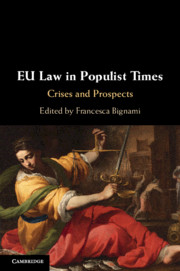Book contents
- EU Law in Populist Times
- EU Law in Populist Times
- Copyright page
- Contents
- Notes on Contributors
- Preface
- Introduction
- I Economic Policy
- II Human Migration
- III Internal Security
- 10 The EU and International Terrorism
- 11 The Preventive Turn in European Security Policy
- 12 The Opening Salvo
- 13 Preserving Article 8 in Times of Crisis
- 14 Progress and Failure in the Area of Freedom, Security, and Justice
- IV Constitutional Fundamentals
- Conclusion
- Index
11 - The Preventive Turn in European Security Policy
Towards a Rule of Law Crisis?
from III - Internal Security
Published online by Cambridge University Press: 05 December 2019
- EU Law in Populist Times
- EU Law in Populist Times
- Copyright page
- Contents
- Notes on Contributors
- Preface
- Introduction
- I Economic Policy
- II Human Migration
- III Internal Security
- 10 The EU and International Terrorism
- 11 The Preventive Turn in European Security Policy
- 12 The Opening Salvo
- 13 Preserving Article 8 in Times of Crisis
- 14 Progress and Failure in the Area of Freedom, Security, and Justice
- IV Constitutional Fundamentals
- Conclusion
- Index
Summary
Security has been at the heart of European integration, in one way or another, since the entry into force of the Maastricht Treaty. A series of terrorist attacks in the 2000s, including 9/11, 7/7 and the Madrid bombings, has been followed by a plethora of responses by the EU legislator, with EU intervention being justified as emergency law and pushing boundaries in criminal law and the constitutional systems of the Union and its Member States. This pattern of EU response has been replicated after successive terrorist incidents, resulting in a patchwork of measures adopted swiftly, without detailed justification or impact assessment and resembling at times kneejerk reactions or quick fixes to complex issues, while presenting significant challenges to fundamental rights and the rule of law in Europe. In recent years, the development of a European security strategy and the publication of regular reports on the Security Union might be said to represent a more strategic response. The Security Union reports, however, betray a tendency to pursue relentlessly and uncritically a security agenda without due consideration for the protection of fundamental rights and the rule of law.
- Type
- Chapter
- Information
- EU Law in Populist TimesCrises and Prospects, pp. 301 - 318Publisher: Cambridge University PressPrint publication year: 2020
- 16
- Cited by



